June 21, 2025 | 03:55 GMT +7
June 21, 2025 | 03:55 GMT +7
Hotline: 0913.378.918
June 21, 2025 | 03:55 GMT +7
Hotline: 0913.378.918
Shallots play an essential role in the crop structure of Soc Trang province. Thanks to the unique soil, climate and production techniques in Vinh Chau town, locally-produced shallots possess high quality and long storage life compared to that of other regions of the country.
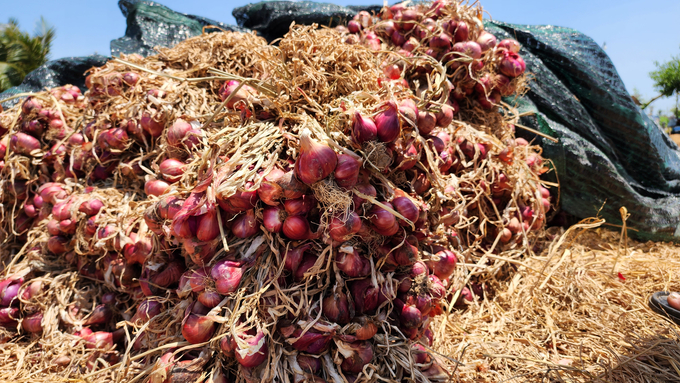
Shallots play an essential role in the crop structure of Soc Trang province. Photo: Kim Anh.
Soc Trang province's agricultural sector has promoted and replicated various organic shallot production models to improve the quality and value of local shallots, adapt to climate change, and reduce pest pressure.
Approximately 6,500 hectares of Soc Trang's land are dedicated to shallot production. Shallots are produced following safe production methods and organic farming practices on 1,140 hectares, concentrating mainly in Vinh Chau town.
Mr. Ong Phen is from a Khmer ethnic household in Vinh Hai commune, Vinh Chau town, and has produced shallots organically for at least 40 years. He shared that shallot cultivation is his family tradition, and he grew up with the strong aroma of shallots. According to Mr. Phen, shallot cultivation was extremely difficult in the past because there was no water well. As a result, shallot farmers had to carry 200 to 300 pails of water from the river to the fields on a daily basis to irrigate the onions.
Thanks to the rapid development of science and technology, the production of shallots in Vinh Chau town has become more convenient. According to Mr. Phen, if he followed the traditional methods of cultivation, the family's shallots would not be able to compete on the market. He decided to cooperate with Que Lam Group to convert to organic shallot production.
The news reporter found Mr. Ong Phen's son weeding and watering the one-month-old shallot field under the extreme heat and weather. Mr. Ong Hoang Tich continues to pursue the organic model of growing shallots following his father's footsteps.
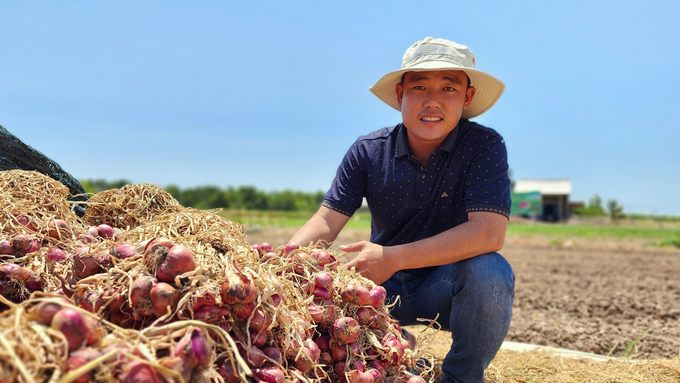
Mr. Ong Hoang Tich from Vinh Hai commune, Vinh Chau town, Soc Trang province is developing an organic model of shallot production. Photo: Kim Anh.
Mr. Tich started producing shallots organically on 1 hectare of land. He commented that this production method is relatively new so it can be difficult to implement. Output for organic shallots is another concern because high selling prices may discourage potential consumers. Technical support from Soc Trang province's agricultural sector as well as Que Lam Group's commitment to product consumption have motivated Mr. Tich to attempt the model to great success.
“During the first year of implementation, the results were disappointing because organic fertilizers gave lower yields compared to chemical fertilizers. I persisted in following the organic production process through the second year, and the yield began to improve. So far, the model has been in implementation for 5 years. The resulting shallots are big and firm, with a qualified color", Mr. Tich shared the secret of growing organic shallots.
Mr. Tich's shallot field yielded an output between 18 and 20 tons in the 2022 - 2023 crop. According to Mr. Tich, the traditional production method relied heavily on using chemical fertilizers every year so the yield gradually decreases. However, organic shallot production gives increasingly better yield for every crop. Additionally, farmers can reduce the cost of fertilizer investment by up to 50%, so profit is higher. Organic shallots are reported to have a shelf life of 5 to 7 months, compared to the 3 to 4 months of traditionally produced shallots.
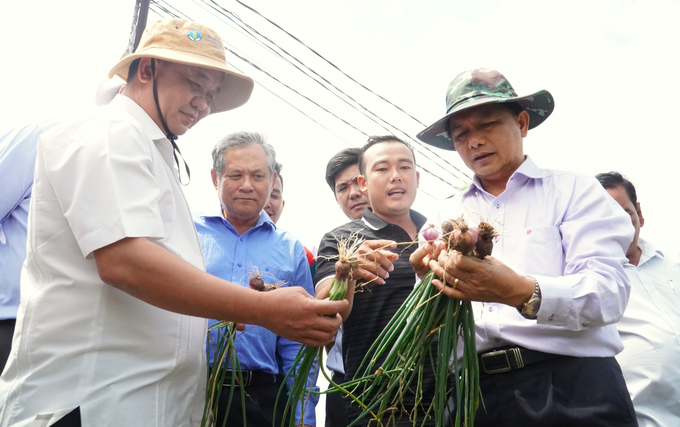
Mr. Tran Van Lau (far right), Chairman of Soc Trang Provincial People's Committee inspecting the production area to promote the production and consumption linkage of shallots between farmers in Vinh Chau town and Que Lam Group. Photo: Van Vu.
Mr. Tich aims to expand beyond the family-scale production by associating with other shallot farmers in the region to create a large raw material area. Consequently, he aims to establish a value chain from production to consumption, meeting the demand of major businesses. Mr. Tich is determined to export shallots and consequently raise the prices for Vinh Chau shallots.
There are currently more than 45 businesses, cooperatives and traders in Vinh Chau town who trade in shallots. In addition, the town has 4 cold storages with a capacity of 3,000 tons. However, product consumption is highly unstable with constantly changing prices when most of the shallot farmers have to depend on local businesses and traders. More importantly, some organic production models are linked to businesses, but the output is low, mainly serving domestic consumption.
SaMaKi Organic Agricultural Products Cooperative has 12 hectares of shallot organic production linkage, with an annual output between 450 and 500 tons. The cooperative depended mainly on local traders for its output in the past. The cooperative aims to implement the organic and safe production of shallots; meet VietGAP production standards; acquire OCOP certification and growing area code certification; diversify models and specifications according to customers' needs; establish a system of post-harvest storage warehouses for shallots; ensure a stable supply; create favorable conditions for the export of shallots.
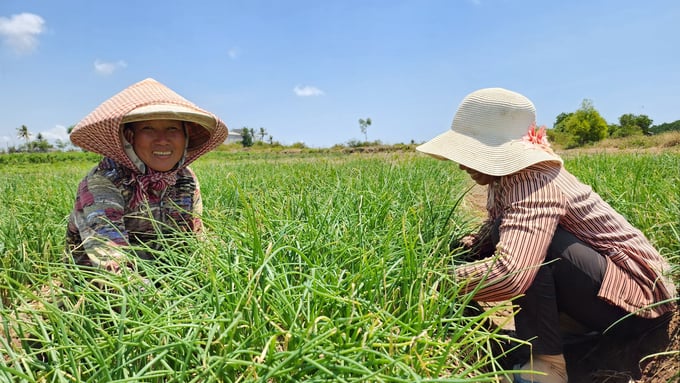
Soc Trang currently has over 1,100 hectares of organic shallot production. Photo: Kim Anh.
According to a business specializing in trading shallot products in Vinh Chau town, local shallot exports face great difficulties due to competitive pressure from the Thai market. Namely, the seasonal schedule of Vinh Chau shallot production almost entirely coincides with that of Thailand. On the other hand, shallot exports to fastidious markets such as the US and Japan require certificates of production standards including GlobalGAP, GMP, and so on. Most shallot growing areas in Soc Trang have not acquired these certificates.
Soc Trang province has attempted to meet the requirements for certification of production linkages between farmers and businesses, or the pilot models of organic areas, but the scale and area are limited. This is the bottleneck that prevents Vinh Chau shallots from reaching foreign markets.
The Forum on connecting agricultural products 970 with the theme "Connecting trade, promoting consumption of onions and shallots" was recently organized by the Ministry of Agriculture and Rural Development in collaboration with Soc Trang Provincial People's Committee. Mr. Nguyen Nhu Tiep, Head of Agro Processing and Market Development Authority under the Ministry of Agriculture and Rural Development remarked that the province needs to establish a brand name for the local shallot to facilitate its consumption. Furthermore, stories associated with Vinh Chau shallot products must be promoted to introduce their unique strengths to consumers, thereby affirming the brand and price.
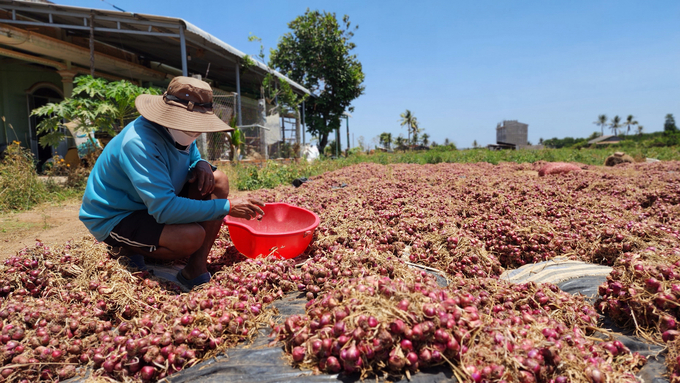
Soc Trang province needs a solution to reduce input costs for local shallot farmers. Photo: Van Vu.
In addition, Soc Trang province needs a solution to overcome difficulties caused by the non-standardization of seeds and planting area. Moreover, the province needs to reduce input costs and produce shallots with uniform quality. With the increasingly strict requirements from international markets, shallot farmers dedicate entirely to organic production, accompanied by organic certifications from reputable organizations recognized worldwide.
The potential of shallot consumption market is extremely promising. Shallots' utility is not only limited to seasoning in food processing, but also they can also be used as raw materials for other industries such as confectionery, pharmaceuticals, etc. Soc Trang province needs to develop along the mindset of "shallot is not only used as food products but also as raw materials for various industries”. Consequently, this will help province farmers avoid heavy losses caused by low selling prices.
Translated by Nguyen Hai Long
![Turning wind and rain into action: [9] Digitizing hydrometeorological data in response to climate change](https://t.ex-cdn.com/nongnghiepmoitruong.vn/608w/files/news/2025/06/17/z6704423696987_15fd32ffc26d590d204d520c9dac6786-nongnghiep-165943.jpg)
(VAN) Farmers have begun accessing hydrometeorological applications to adjust their cropping schedules, aiming to ensure productivity and adapt to climate change.
![Turning wind and rain into action: [8] Real-time salinity detection and early warning technology](https://t.ex-cdn.com/nongnghiepmoitruong.vn/608w/files/news/2025/06/17/z6704423696987_15fd32ffc26d590d204d520c9dac6786-nongnghiep-151127.jpg)
(VAN) Thanks to the integration of modern hydrological-hydraulic models, remote sensing technologies, and artificial intelligence, the accuracy of hydrological forecasting has significantly improved.
![Turning wind and rain into action: [7] Early disaster warnings help marine farmers minimize losses](https://t.ex-cdn.com/nongnghiepmoitruong.vn/608w/files/news/2025/06/17/z6704423696987_15fd32ffc26d590d204d520c9dac6786-nongnghiep-142942.jpg)
(VAN) In recent years, thanks to early disaster warnings and forecasting, marine farmers in Khanh Hoa province have been able to reduce risks and losses, thereby improving production efficiency.
![Turning wind and rain into action: [6] ‘Four on-the-spot’ disaster management software](https://t.ex-cdn.com/nongnghiepmoitruong.vn/608w/files/news/2025/06/17/e5a48259d6a262fc3bb3-nongnghiep-183800.jpg)
(VAN) By simply activating the scenario on the disaster management software, the relevant authorities immediately know how many households need to be evacuated, where to evacuate them to, and by what means of transportation…
![Turning wind and rain into action: [5] Hue applies modern technology in disaster forecasting](https://t.ex-cdn.com/nongnghiepmoitruong.vn/608w/files/news/2025/06/17/z6704423696987_15fd32ffc26d590d204d520c9dac6786-nongnghiep-093938.jpg)
(VAN) In Hue city, modern technology has recently been applied in meteorological and hydrological forecasting and warning, helping to reduce the damage caused by natural disasters.

(VAN) A cutting-edge farming technique being implemented on an experimental ranch in Arizona's Sonoran Desert has already saved a billion gallons of water over five years, according to Civil Eats.

(VAN) Poultry and pig production and the environment can be boosted through enhanced water technology, according to new research.